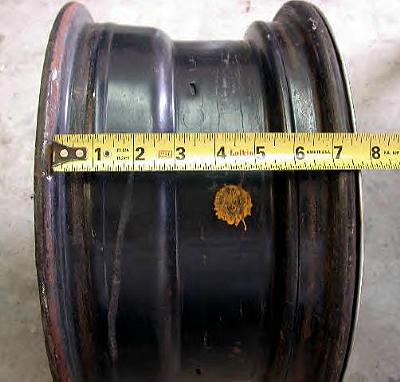We see a lot of questions on our site about wheel fitment.
This page is a guide as to what size wheels your Ford Ranger takes, and how to measure wheels in general.
Quick Info:
The Ford Ranger, Bronco II and Explorer all have a 5×4.5 bolt pattern.
The basic Ranger wheel diameter is either 14×6 or 15×7 inches.
Stock Backspacing is usually 4.5 inches.
Recommended backspacing on a 15×7 wheel is 3.75 inches with -6mm offset.*
Recommended backspacing on a 15×8 wheel is 3.75 inches with -19mm offset.*
Recommended backspacing on a 15×10 wheel is 4.00 inches with -38mm offset.*
(* = Information provided by American Racing)
Center Bore listed for the Ranger ranges from 70.3 – 70.5 depending on the wheel manufacturer and chart you find.
Wheels on a 1998+ 4×4 Ranger will not fit the front of a 1983-1997 4×4 Ranger. The center hole is too small for the locking hub to pass through. You would have to have the hub center cut out by a machine shop to fit over the hub.
Measuring a Wheel:
Reference Diagram:
When discussing wheel measurements, you need to know what each description is referring to. This diagram should help.
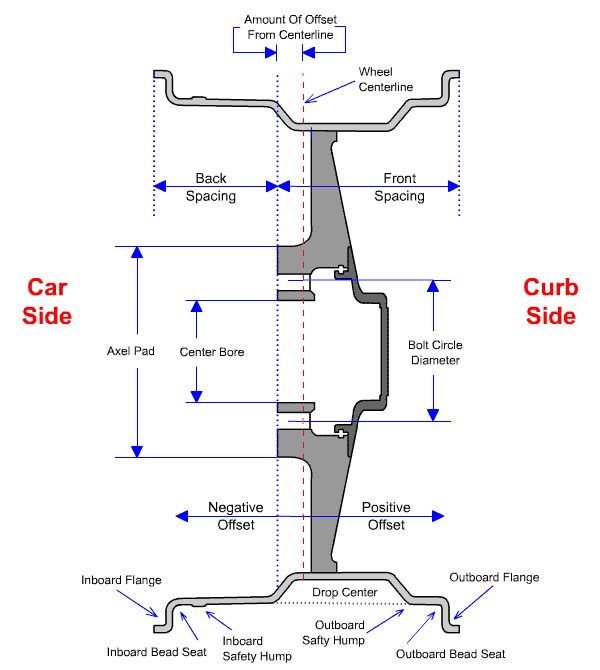
Wheel Diameter:
One of the first things your your going to deal width is wheel size. Wheel sizes (Example 15×8) is a combination of wheel diameter and rim width.

The wheel diameter is measured by measuring from the bead seat on one side of the rim to the opposite side bead seat. The bead seat is the part of the wheel where the bead of the tire sits once the tire is inflated. It is not measured from the outside rim to outside rim.
Rim Width:
A common mistake when measuring a rim’s width is measuring the absolute width of the wheel.
To determine the width of the rim, measure from bead seat to bead seat across the wheel, not from lip to lip. The bead seat is the part of the wheel where the bead of the tire sits once the tire is inflated.
Bolt Patterns:
The Ford Ranger and Bronco II have a 5×4.5 wheel bolt pattern. The diagram below will show you how to measure wheel bolt patterns.
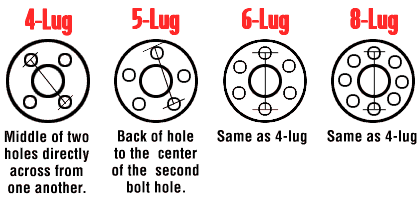
4-Lug – Measure from the center of the first lug to the center of the third lug in the pattern (opposite Holes).
5-Lug – Measure from the back of the first lug to the center of the third lug in the pattern.
6-Lug – Measure from the center of the first lug to the center of the fourth lug in the pattern (opposite Holes).
8-Lug – Measure from the center of the first lug to the center of the fifth lug in the pattern (opposite Holes).
Putting It All Together:
(# of Lugs) X (Measurement Between Specified Lugs)
Example: (5 Lugs) X (4.5″ Between Lugs 1 And 3) = 5×4.5 Lug Pattern
Backspacing:
Backspacing is the distance from the axle pad (the part that contacts the wheel hub) to the inner edge plane (inboard flange).
Deeper backspacing moves the wheel and tire inboard on the vehicle; shallower moves them outboard.
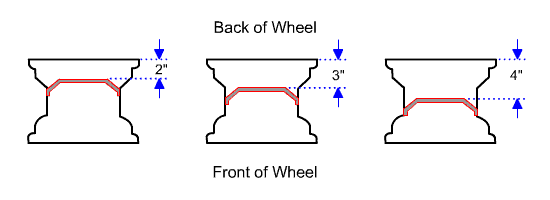
The diagram above shows a 2″, 3″ and 4″ backspace.
Frontspacing is the direct opposite of backspace. Subtract backspace from overall wheel width to get front space measurement.
Items required to measure wheel backspace:
1) Tape measure (ruler)
2) Straightedge that will fit within the inboard flange of the wheel
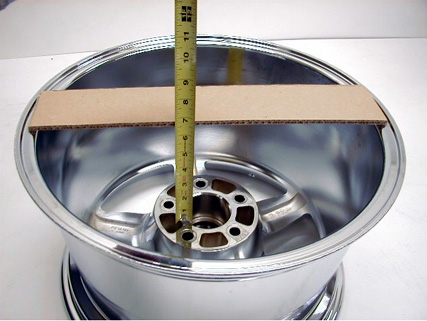
Offset:
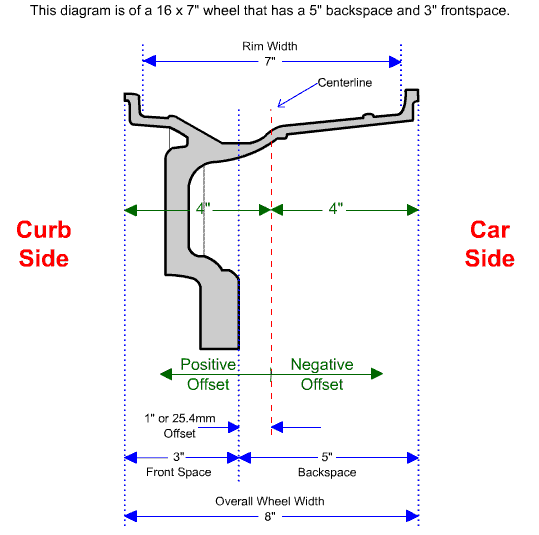
Offset is the distance +/- from wheel centerline, indicated in millimeters. To find the offset of a wheel you will need to measure the wheel for overall width and measure its front space (see Backspacing above).
Once you have these two measurements you need to subtract the front space measurement from 1/2 of the overall wheel width.
Example: A 16×7″ wheel is approximately 8″ wide overall, half of the overall wheel width of 8″ is 4″. Then 4″ – 3″ (front space) = 1″
If the resultant number is positive then the wheel has a positive offset. If the number is negative then the wheel has a negative offset.
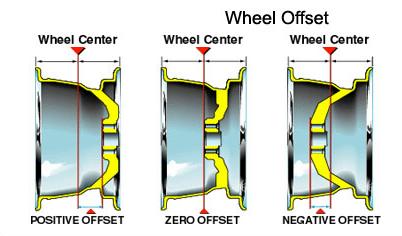
Offset is stated in millimeters so that it can be differentiated from back and front spacing. To convert inches into millimeters multiply by 25.4.
Example: 1″ x 25.4 = 25.4mm
The wheel in the diagram above has a 25mm positive offset.
Backspace to Offset Conversion Chart:
The table below is a quick reference for finding offset. Pick the rim width and follow the row over to the backspace of your wheel.
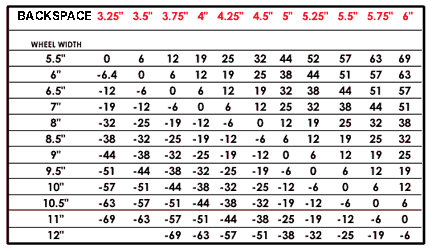
Wheel Spacers / Adapters:
Wheel spacers can be purchased to the wheel out farther. They can also be purchased to adapt an axle to accept a different wheel bolt pattern. They are used by people to space wheels out away from the vehicle if they are swapping rims that don’t have the proper back spacing. Sometimes enthusiasts use a spacer when swapping Mustang rims on to their 2WD Ranger to allow enough space for the front center cap to snap on to the wheel.
The adapters are generally used when people swap in an axle that has a wheel bolt pattern different than the other axle on the vehicle. Adding adapters to one of these axles will allow the vehicle to use wheels that can be mounted on either axle.
The spacers/adapters mount by bolting on to the hub where the original wheel studs are and have new wheel studs in the spacer/adapter.
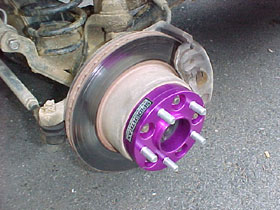
Center Bore (Hole):
The center bore is the diameter of the hole in the middle of the wheel (see diagram at top of page). You may find a rim with the proper backspacing and wheel bolt pattern, but the center bore may be too small. In this case, the wheel will not fit over the center hub of the axle. This can be fixed by some machine shops that can cut the hole out larger.
Wheels on a 1998+ 4×4 Ranger will not fit the front of a 1983-1997 4×4 Ranger. The center hole is too small for the locking hub to pass through.
Likewise, any 4×4 wheel specifically designed for the newer, flat front hubs (without a hub lock) will not fit the front hubs of any 2×4 ranger. It’s theoretically possible to put torsion bar 4×4 hub/spindles on a 2×4 Ranger, they use the same calipers and ball joints though this would be a lot of effort. ~ Sean Votier
Caliper Clearance & Hub Clearance:
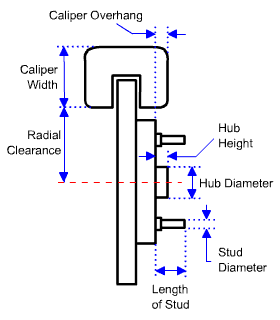
Caliper overhang: Is used to determine the clearance needed to the backside of the spokes of the wheel.
Caliper width: Used in conjunction with caliper overhang.
Radial Clearance: Caliper Radial Clearance.
Hub Height: Height of hub diameter. If stepped, both heights required for accuracy.
Hub Diameter: sometimes has a step in it that requires both measurements to be accurate.
Length of Stud: Length of lug stud, Helpful if changed from factory.
Stud Diameter: Wheel stud diameter.
As a general rule: there should be a minimum of one-quarter inch (.250) clearance between the wheel and any braking or suspension component.
Typical Lug Nut Torque Specifications:
| Lug Size | Ft/Lbs Torque |
|---|---|
| 7/16″ | 55-65 |
| 1/2″ | 75-85 |
| 9/16″ | 95-115 |
| 5/8″ | 135-145 |
| 12mm | 72-80 |
| 14mm | 85-95 |
NOTICE: As with all types of wheels retorque lug nuts after the first 25 miles & at 100 mile intervals until lug torque is maintained.
Note: Always refer to Owner’s Manual for proper factory specifications that take precedence over the listed recommendations.
Tire Clearance:
Having proper tire clearance is critical for a positive wheel/tire installation experience. There is no “cast in stone” rule to determine the proper amount of clearance between the tire and body of the car. There should be no less than what is required to avoid ALL contact between suspension and sheet metal in all driving situations.
Keep these in mind when measuring your car:
Brake components: Brake lines (metal / rubber), sensors, backing plates, etc.
Suspension components: Upper and lower control arms, springs, struts, shocks, tie rods, sway bars, ball joints, Etc.
Sheet metal: Trim screws, fender lip overhang, inner sheet metal, any sharp edge, Etc.
Beadlock Wheels:
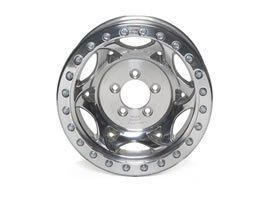
Beadlock wheels lock the outside of the tire to the rim with grade 8 bolts instead of the air pressure and a lip that holds tires to conventional rims. Beadlock rims are basically a two piece rim (the wheel and the lock ring) that sandwich the tire between the two pieces of rim. This allows you to run very low air pressure to increase traction (1-7 PSI) without risk of de-beading or popping the tire off the rim. Most beadlock companies lock the outside edge because of the way force is applied to the tire during rock crawling. In rockcrawling, the outside bead is 90% more likely to come off the wheel then the inside bead.
Vehicles That Have a 5×4.5 Wheel Bolt Pattern:
Here is a list of vehicles that have wheels with a 5×4.5 bolt pattern. This doesn’t necessarily mean that the wheels will fit your Ranger without some type of modifications.
| Ford: | |
| All full size cars | 1979-85 |
| Aerostar | 1986-97 |
| Bronco II | 1983-90 |
| Crown Victoria | 1979-Current |
| Country Squire | All Years* |
| Custom | 1965-85 |
| Explorer | 1991-Current |
| F-100 | 1980-85 |
| Fairlane | 1962-79 |
| Falcon | 1968-71 |
| Futura | 1965-85 |
| Glaxie | 1965-85 |
| Granada | All Years* |
| LTD | 1971-80* |
| Maverick | 1971-80 |
| Monarch | All Years* |
| Mustang | 1965-73 (small center hole) SVO 1985-86 1994-Current |
| Mustang II | 1974-78 |
| Probe | 1989-98 |
| Ranchero | 1968-84 |
| Ranger | All Years |
| Thunderbird | 1955-71 1977-79 |
| Torino | 1971-80 |
| Lincoln | |
| Continental | 1984-87 |
| Jeep | |
| Cherokee (XJ) | 1984-01 |
| Wagoneer (XJ) | 1984-89 |
| Brairwood (XJ) | 1984-91 |
| Comanche (MJ) | 1984-92 |
| Grand Cherokee (ZJ) | 1993-98 |
| Wrangler (YJ) | 1987-95 |
| Wrangler (TJ) | 1997-06 (small center hole) |
| Liberty (KJ) | 2002-present |
| Dodge | |
| Dakota | 1987-90 |
| Ram 150 | 1974-85 |
| Ram Charger | 1974-85 |
Note About Jeep Rims (contributed by compleckz):
Stock 15×7 steel wheels from my girlfriends 1996 Cherokee 4×4 fit fine on the rear, but the offset caused the rim to hit the caliper in the front of my 1997 Ranger 4×4. The rim could not spin, but it fit over the hub perfectly fine.
I currently have some 15×8 aftermarket steel wheels from a Jeep Cherokee on my Ranger, I believe the backspacing is 4″. They fit fine, but the extra backspacing causes the 33’s to rub on the radius arm more (need to adjust the stops). Even though these rims are .25″ different than my 3.75″ backspace rims, they appear to suck into the truck A LOT more. I currently have one 4″ backspace rim on the left rear, and one 3.75″ on the right rear. The difference is quite noticeable and I have to say the 3.75″ backspace rim looks much better.
Mustang Wheels:
Many Ford Ranger owners have swapped the wheels from a Ford Mustang on their Rangers. For more information, check out the Mustang Wheel Page.
Ranger Rims:
Here is a list of rims offered on the Ford Ranger from 1988-2007. We didn’t list the basic steel wheels, just the upgraded ones for better appearance.
Note: Bronco II’s shared the same wheels with the Ranger.
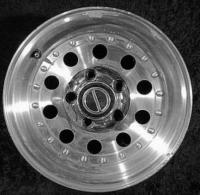
1988-1992 (14×6 & 15×7) |
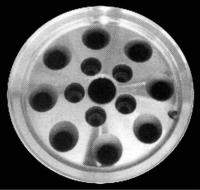
1990-1991 (14×6) |
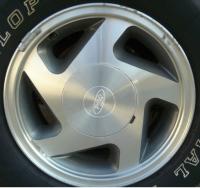
1991-1994 (15×7) |
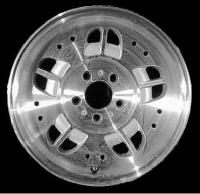
1993-1995 (14×6 & 15×7) (Commonly referred to as ‘Deer Hoof’ rims) |
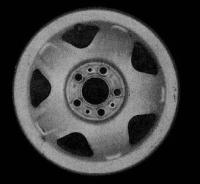
1993-1997 (15×7) – Steel
|
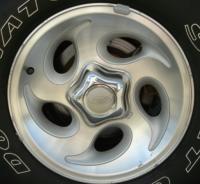
1995-1998 (15×7)
|
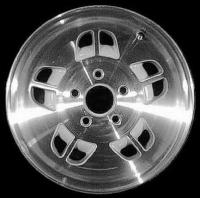
1996-1999 (14×6 & 15×7) (14×6 only for 1998) |
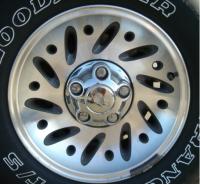
1998-1999 (15×7)
|
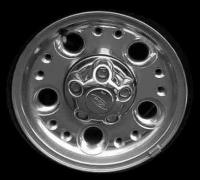
1998-Only (14×6)
|
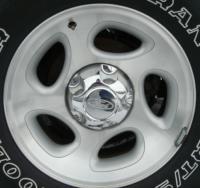
1998-2007 (16×7) |
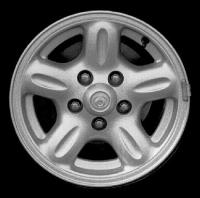
1998-1999 (14×6) |
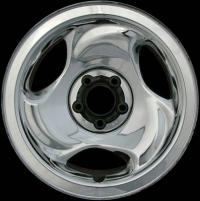
1998-1999 (16×7) – Steel Chrome |
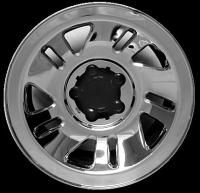
1998-1999 (15×7) – Steel Chrome or Gray |
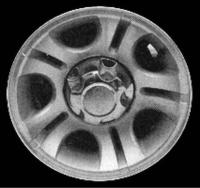
2000-2007 (15×7) D-Shape Slots |
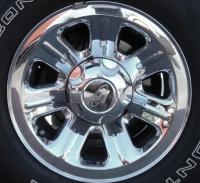
2000-2004 (15×7) – Steel Chrome |
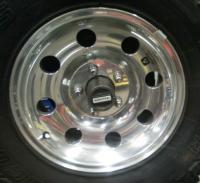
2001-2007 (15×7) |
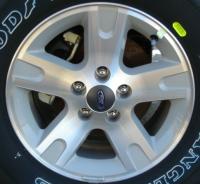
2002-2007 (16×7) |
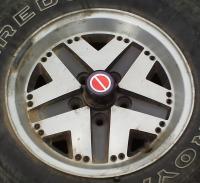
1985-1988 Ranger (15×7) |
Explorer Rims:
In addition to some of the wheels shown above, the Explorer also offered these wheels:
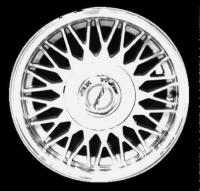
1994-1995 – Explorer (15×6.5) |
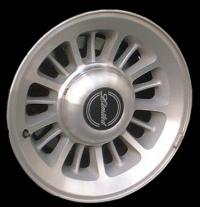
1996-1998 Explorer (15×7) |
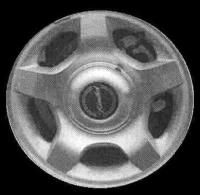
1999-2001 Explorer (16×7) |
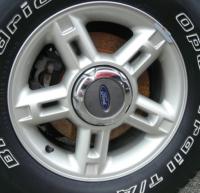
2002-2005 Explorer (16×7) |
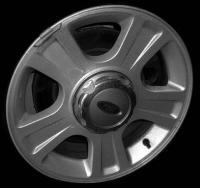
2002-2005 Explorer (16×7) |
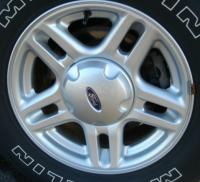
2002-2003 Explorer (16×7) |
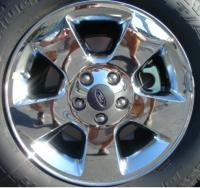
2003-2007 Explorer (17×7.5) (5 x 135 bolt pattern) |
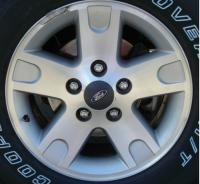
2005 Explorer (16×7) (5×4.25 Bolt Pattern) |
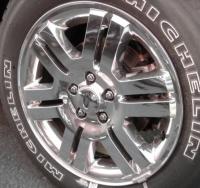
2006-2007 Explorer (18×7.5) |
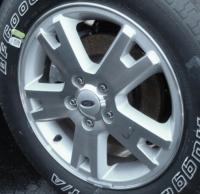
2006-2007 Explorer (17×7.5) |
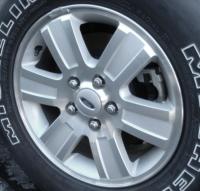
2006-2007 Explorer (16×7) |
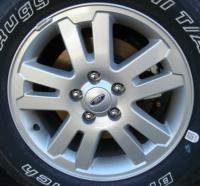
2006-2007 Explorer (17×7.5) |
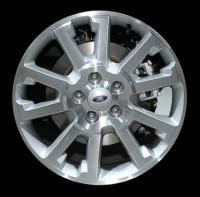
2007 Explorer (18×7.5) |
Want To Contribute?
Do you have photos looking down the side of your truck that would show how far your wheels stick out? If you know the rim size (5×10?) and the backspacing (3.75?) and would like to send us a photo so others can judge what different wheel sizes and backspacing would look like, please Contact Us.
Have photos of a factory wheel from another vehicle that fits on your Ranger? Send us a photo of your vehicle with the rims on it Contact Us.
Need More Help:
Check out our Ford Ranger Wheel & Tire Forum.

